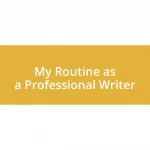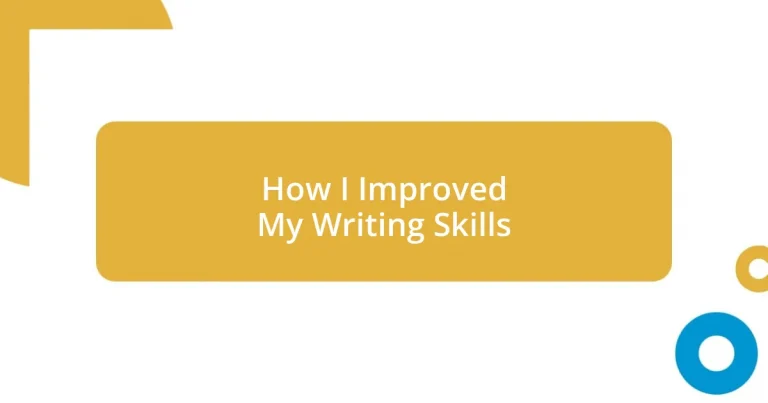Key takeaways:
- Strong writing skills are essential for effective communication and can open up job opportunities.
- Setting clear, realistic, and flexible writing goals helps develop consistency and maintain motivation.
- Seeking feedback and engaging in writing workshops can significantly enhance writing skills and foster a sense of community.
- Reading widely and critically informs and enriches one’s own writing style and creativity.
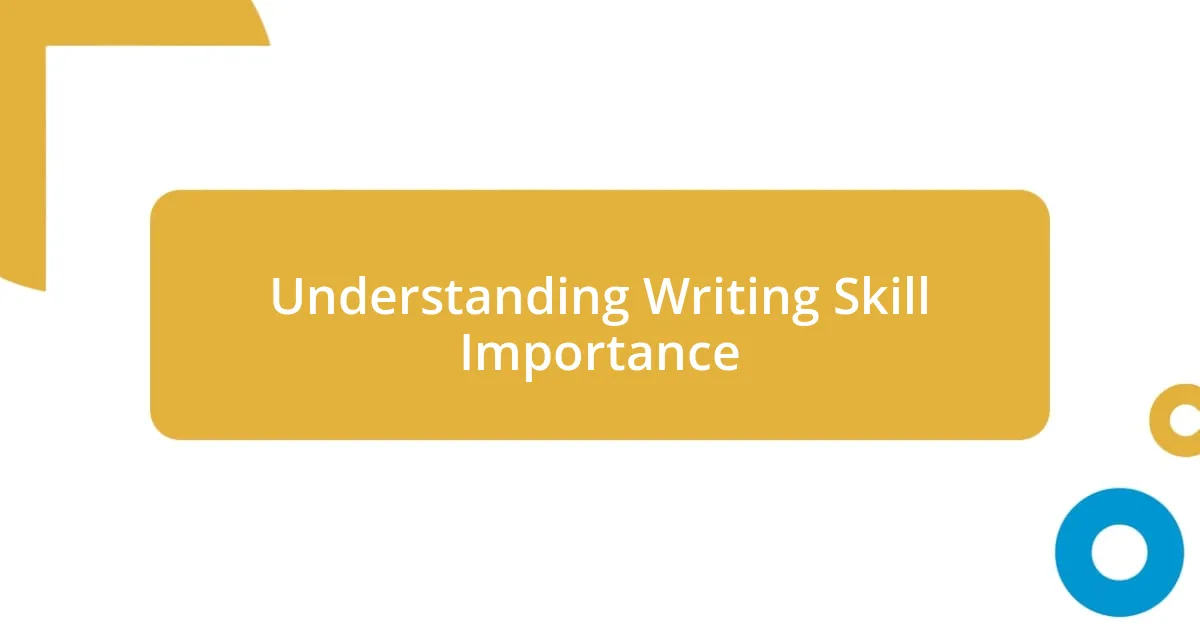
Understanding Writing Skill Importance
Writing skills are the backbone of effective communication. I remember the first time I had to present my ideas in an email to my boss. It was nerve-wracking! I realized that if I couldn’t articulate my thoughts clearly, my ideas would be lost, and my confidence would take a hit.
When I contemplate the impact of strong writing skills, I can’t help but think about how they open doors. Consider this: how many job opportunities have I missed because my resume didn’t convey my strengths well enough? Just like in a conversation, the way I present myself on paper can make all the difference in getting my foot in the door.
Moreover, writing is more than just a skill; it’s an art that reflects my thoughts and emotions. I often go back to a piece I wrote during a challenging time in my life. It wasn’t just about expressing difficulties; it was a way to process my feelings and connect with others who might feel the same. Isn’t that powerful? Writing has an intrinsic value, serving both the writer and the reader in a profound way.
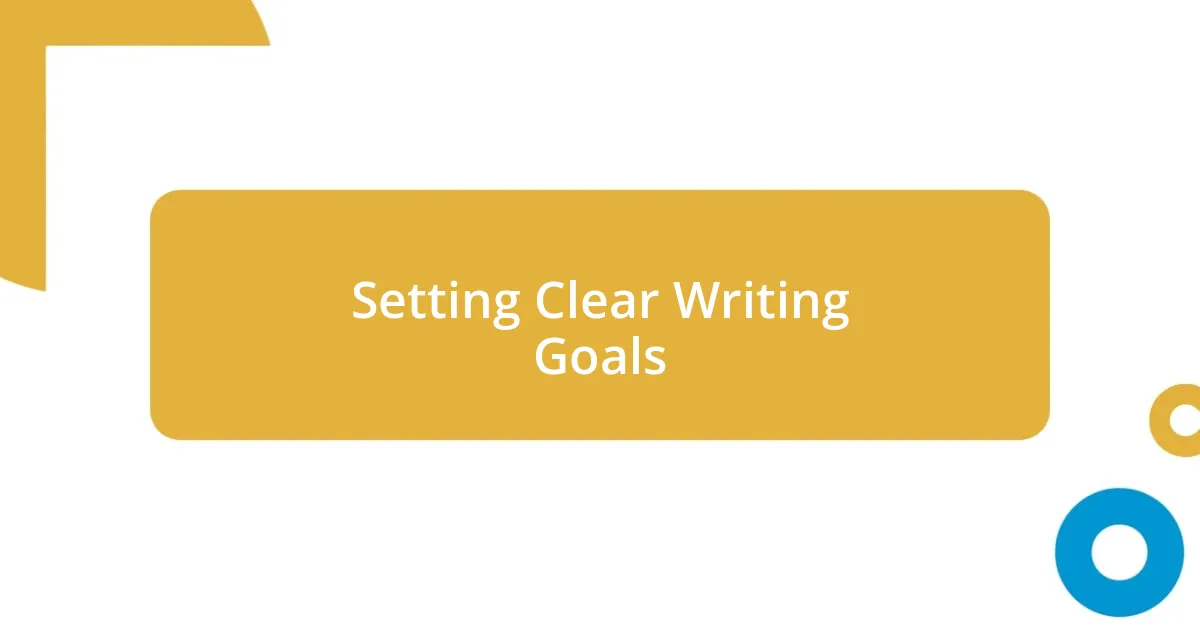
Setting Clear Writing Goals
Setting clear writing goals has been a transformative step in my journey. When I first started, I often approached writing without a clear target, leading to frustration and wasted effort. I remember setting a simple goal to write for just 15 minutes daily, and it felt liberating. That small commitment ultimately helped me develop a consistent writing habit.
As I grew more comfortable, I began setting specific targets, like completing one blog post each week. This not only kept my momentum going but also allowed me to measure progress, which is incredibly rewarding. I believe having tangible goals is essential; they help turn abstract intentions into actionable plans.
Another vital aspect of goal-setting is making sure they’re realistic and aligned with my personal growth. I’ve learned to embrace flexibility in my goals, understanding that life can be unpredictable. For example, if a week gets particularly busy, I adjust my writing goal instead of abandoning it completely. This adaptability has made a significant difference in sustaining my motivation and improving my skills over time.
| Writing Goal Type | Example |
|---|---|
| Daily Commitment | Write for 15 minutes each day |
| Weekly Target | Complete one blog post per week |
| Flexible Goals | Adjust writing time based on schedule |
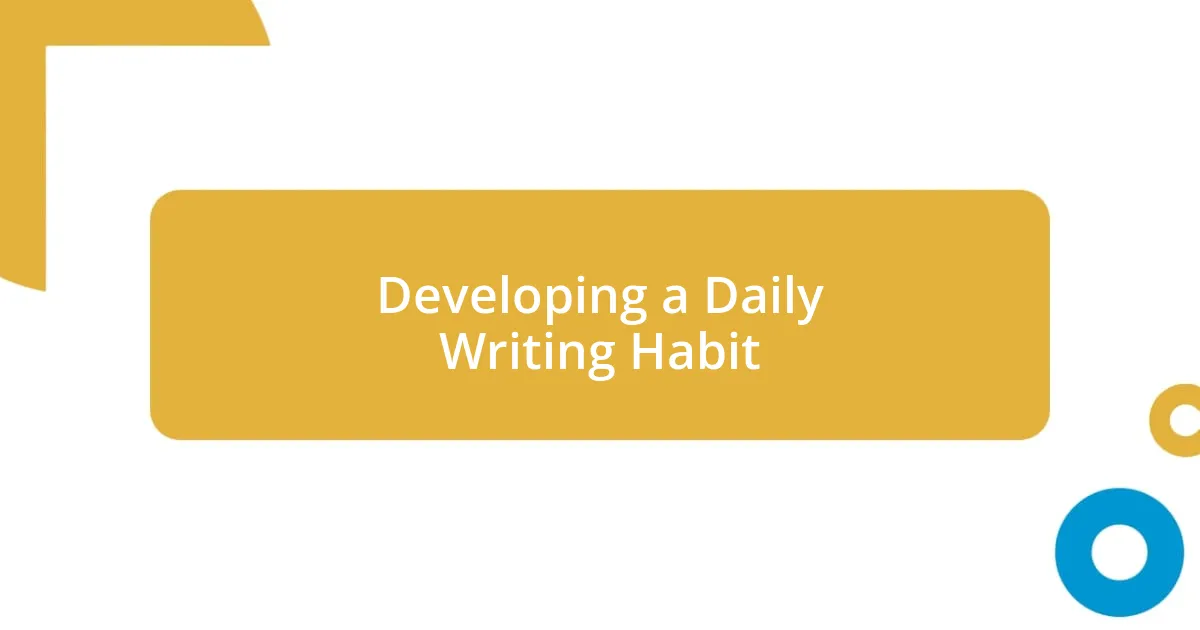
Developing a Daily Writing Habit
Developing a daily writing habit was a game-changer for me. I still remember the days when I would sit at my desk, staring at the blank page, feeling overwhelmed. It took some time, but I found that dedicating even just 10 minutes every day made writing less intimidating and more enjoyable. Eventually, I became excited about those brief sessions, which transformed into longer periods as I started to see my progress and enjoy the flow of ideas.
- Start small; begin with just 10-15 minutes a day.
- Write at the same time each day to create a routine.
- Keep a journal to capture thoughts and feelings regularly.
- Choose topics or prompts that genuinely interest you.
Once I established that routine, I began to notice the positive effects spilling into other areas of my life. There were days when inspiration hit out of nowhere, and I’d find myself scribbling down ideas in the most unexpected places—waiting in line, at a coffee shop, or even during a short break at work. Embracing spontaneity in my writing sparked creativity I didn’t know I had, and these small bursts of inspiration often turned into compelling pieces.
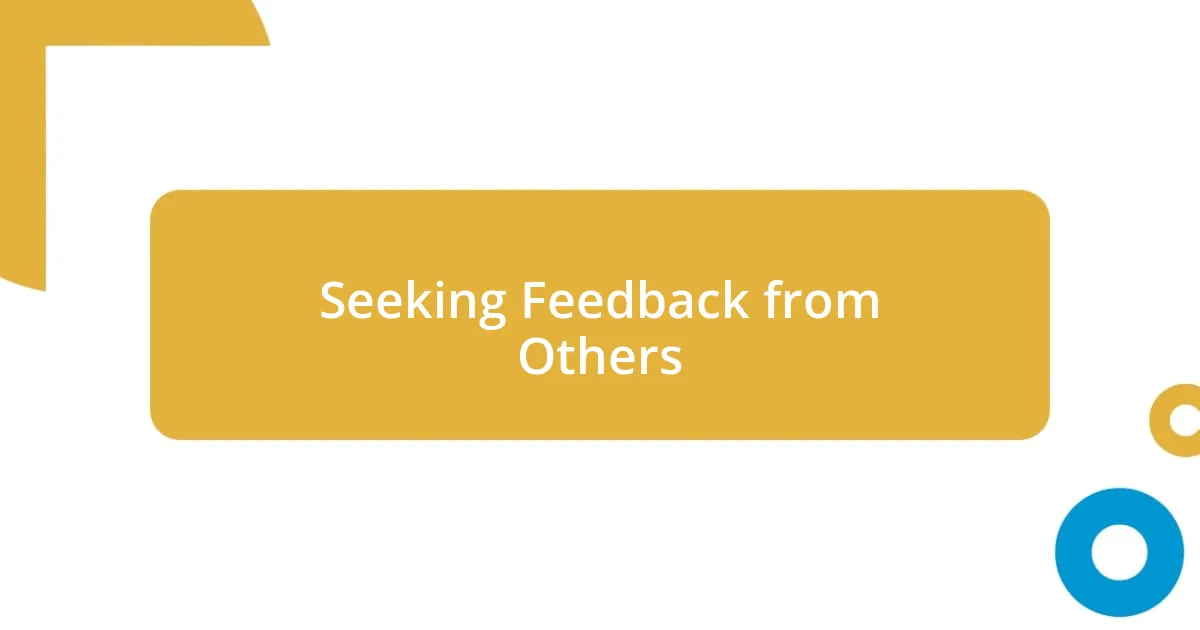
Seeking Feedback from Others
Seeking feedback from others has been one of the most enlightening aspects of my writing journey. I used to think my work was solid just because I felt good about it. But after sharing a few pieces with trusted friends, I quickly realized how valuable their perspectives could be. Their insights opened my eyes to areas I hadn’t even considered, and it felt like lifting a veil that had clouded my understanding.
I remember a time when I submitted an article to a workshop. The critiques were tough, but I welcomed them. One participant pointed out that while my ideas were strong, my transitions lacked fluidity. At first, it stung a little, but now I see that moment as a catalyst. It pushed me to focus on how I connect my thoughts, making my writing much more cohesive and engaging overall.
Every piece of feedback I received shaped my skills; it became a dialogue rather than a monologue. I learned to ask specific questions when seeking input—like, “Do you think the message is clear?” or “What stands out to you?” This strategy not only encouraged deeper discussions but also helped me refine my writing process. By embracing constructive criticism, I transformed my work and gained a supportive network that continues to uplift my literary journey.
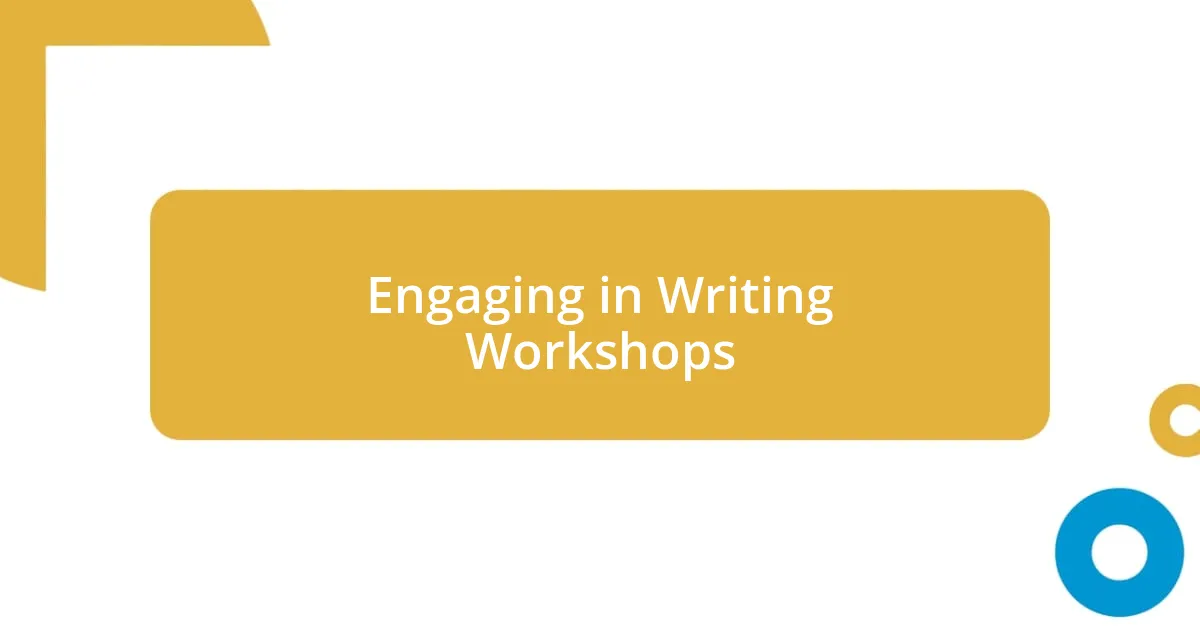
Engaging in Writing Workshops
Engaging in writing workshops was a turning point for my growth as a writer. I remember walking into my first workshop feeling a mix of excitement and anxiety, surrounded by fellow writers who were as passionate as I was. Initially, I struggled to share my work, worried about what others might think. However, once I let my guard down and read my piece aloud, the sense of community was palpable. Suddenly, the butterflies in my stomach transformed into a sense of belonging.
The workshops challenged me in ways I hadn’t anticipated, pushing me to experiment with styles I’d previously deemed “not my thing.” I found myself writing poetry, something I never thought I could do. One exercise involved using found language—words pulled from magazines to create a collage of texture and meaning. I was surprised to discover how liberating this approach could be. It opened my eyes to the different ways my voice could express itself, enriching my overall style.
Listening to others read their work also expanded my horizons. Each writer had a unique perspective and a different approach to storytelling. I found myself asking, “How can I apply some of these techniques to my own writing?” Their constructive critiques not only helped me hone my craft but also inspired me to dig deeper into my own narratives. The experience taught me that every voice at the table is an opportunity for learning, and I cherished those moments of shared vulnerability and growth.
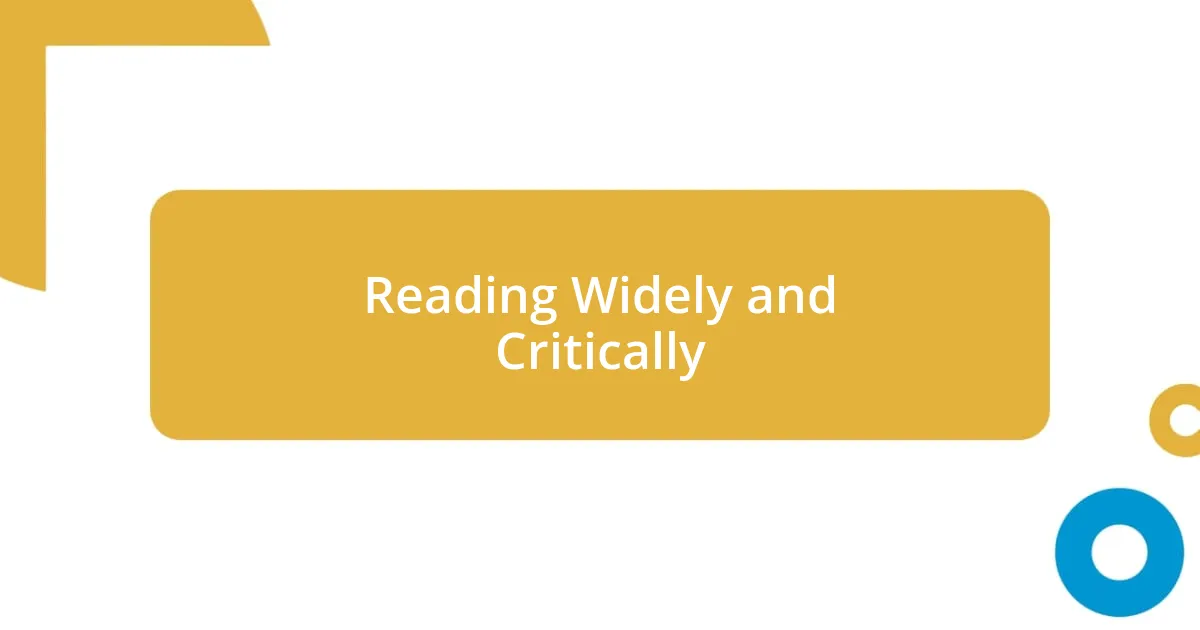
Reading Widely and Critically
Reading widely and critically opened up a whole new world for me as a writer. I vividly remember the first time I picked up a novel outside my usual genre—literary fiction, to be exact. The complexity of the characters and the rich prose not only captivated my attention but also made me realize how different styles can influence my own writing. Have you ever felt that thrill of discovering a piece that resonated deeply with you? It reminds me of the power storytelling holds, and I began to dissect those narratives to understand what made them work.
When I dive into a book, I make a conscious effort to analyze the choices the author made. I remember reading a memoir that moved me to tears—it was raw and authentic. I started to question, “What made this piece so powerful?” Was it the vulnerability or the unsparing detail? I began jotting down notes as I read, identifying techniques like imagery and emotional resonance. This practice of critical reading has now become a vital part of my writing toolkit, allowing me to incorporate those lessons into my work.
As I explored various genres, I noticed how each author has a unique voice—some are lyrical, while others are starkly straightforward. It made me curious: How can I blend different elements to create my own style? For instance, I experimented with minimalist prose after reading an author who crafted impactful messages with less. Diving into different writing styles not only sparked creativity in my writing but encouraged me to step out of my comfort zone. Ultimately, I found that reading widely doesn’t just broaden my perspective; it continuously shapes my voice as a writer, helping me bridge gaps in my understanding and connect with my audience more profoundly.
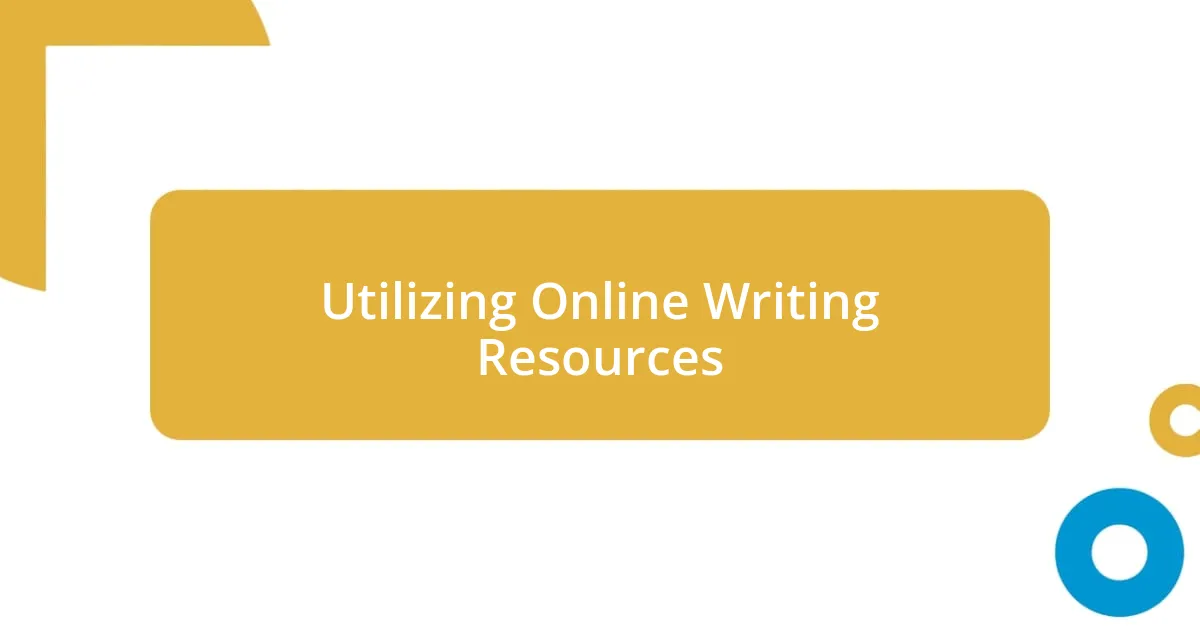
Utilizing Online Writing Resources
Utilizing online writing resources has been a game changer in my journey as a writer. When I first stumbled upon various websites dedicated to writing tips and prompts, I felt a wave of excitement. There’s something incredibly empowering about having a plethora of resources at your fingertips, whether it’s grammar guides, writing forums, or inspirational blogs. Have you ever felt stuck and unsure of your next step? I certainly have, and diving into these resources often reignited my creativity and provided fresh ideas.
I often find myself browsing platforms like Wattpad and Medium, where writers share their work and engage in constructive discussions. One memorable moment was when I shared a short story on a writing forum, and the feedback I received was both surprising and enlightening. It illuminated aspects of my writing I hadn’t even realized needed improvement. The community aspect of these sites fosters a sense of camaraderie; when I read others’ work, I feel inspired and motivated. It’s almost like having a virtual writing workshop available 24/7.









